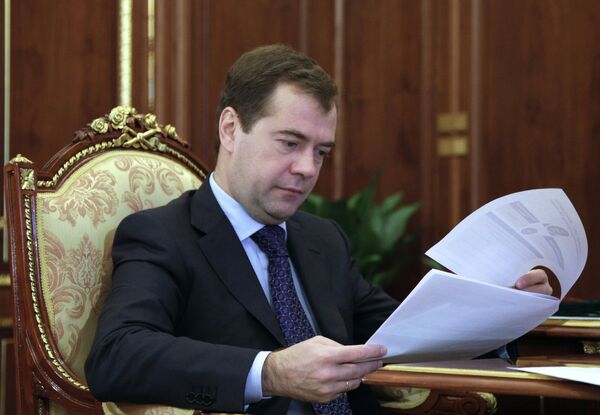MOSCOW, December 10 (RIA Novosti) - Russia will continue supporting the Belarusian economy, President Dmitry Medvedev said after talks with his Belarusian counterpart Alexander Lukashenko on Thursday.
"We have pursued and will pursue a policy aimed at assisting and supporting the Belarusian economy," Medvedev said after a meeting of the Union State's Supreme State Council in Moscow.
Ten years ago, Russia and Belarus signed an agreement to establish a union state, but the plan to create greater political, economic and social integration between the two former Soviet republics has remained largely on paper.
"These 10 years have passed very fast, much has been done and much not done yet," Medvedev said at the Council meeting.
"Ten years have passed, and we can say absolutely frankly today that these years have not been spent in vain, and despite us moving not so fast on some issues as we would like to, the treaty [on establishing the Union State] reflects our urge for integration, our desire to live in the Union State," he said.
Oil and gas prices for Minsk in 2010 could be frozen at the 2009 level, the Russia-Belarus Union State's state secretary, Pavel Borodin, said on Thursday after Medvedev and Lukashenko's meeting.
Medvedev pledged in November a 30-40% discount on natural gas for Belarus in 2010, while Prime Minister Vladimir Putin said last week that a cut in energy prices for Belarus should coincide with Minsk's integration into the Union State with Russia.
Borodin also told journalists that the Union State's Supreme State Council would discuss a draft union constitution and single currency at its next meeting in July 2010 in Minsk.
Medvedev said Russia and Belarus agreed to speed up the ratification of documents signed at the previous meeting of the Supreme State Council, including those on air defense.
Lukashenko said the Union State had not exhausted itself and has good prospects.
"The Union State is not a chimera but a real advanced integration formation on the post-Soviet space. It has clear prospects," he said.
The two countries also adopted a declaration, saying they were aiming to further strengthen the "economic foundation of the Union State," continue work to form a common economic space, encourage mutual investment, boost efforts to develop cultural potential and stating that bilateral relations are of a strategic nature.


